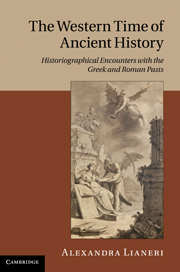Book contents
- Frontmatter
- Contents
- Acknowledgements
- Notes on contributors
- INTRODUCTION
- THEORISING WESTERN TIME: CONCEPTS AND MODELS
- ANCIENT HISTORY AND MODERN TEMPORALITIES
- 5 The making of a bourgeois antiquity: Wilhelm von Humboldt and Greek history
- 6 Modern histories of ancient Greece: Genealogies, contexts and eighteenth-century narrative historiography
- 7 Acquiring (a) historicity: Greek history, temporalities and Eurocentrism in the Sattelzeit (1750–1850)
- 8 Herodotus and Thucydides in the view of nineteenth-century German historians
- 9 Monumentality and the meaning of the past in ancient and modern historiography
- UNFOUNDING TIME IN AND THROUGH ANCIENT HISTORICAL THOUGHT
- AFTERWORD
- Bibliography
- Index
9 - Monumentality and the meaning of the past in ancient and modern historiography
from ANCIENT HISTORY AND MODERN TEMPORALITIES
Published online by Cambridge University Press: 03 May 2011
- Frontmatter
- Contents
- Acknowledgements
- Notes on contributors
- INTRODUCTION
- THEORISING WESTERN TIME: CONCEPTS AND MODELS
- ANCIENT HISTORY AND MODERN TEMPORALITIES
- 5 The making of a bourgeois antiquity: Wilhelm von Humboldt and Greek history
- 6 Modern histories of ancient Greece: Genealogies, contexts and eighteenth-century narrative historiography
- 7 Acquiring (a) historicity: Greek history, temporalities and Eurocentrism in the Sattelzeit (1750–1850)
- 8 Herodotus and Thucydides in the view of nineteenth-century German historians
- 9 Monumentality and the meaning of the past in ancient and modern historiography
- UNFOUNDING TIME IN AND THROUGH ANCIENT HISTORICAL THOUGHT
- AFTERWORD
- Bibliography
- Index
Summary
THEORIES OF THE MONUMENTAL
History belongs to the living man in three respects; it belongs to him as one who acts and strives, as one who preserves and honours, and as one who suffers and needs liberation. This trinity of relationships corresponds to a trinity of kinds of history.
Friedrich Nietzsche's essay ‘On the uses and disadvantages of history for life’ is one of the few extended discussions of the nature and significance of a desire for the past and of the motives that drive the production and consumption of history. In contrast to the prevailing mid-nineteenth-century German view, which saw the acquisition of historical knowledge as an end in itself, he focused on the psychology of the individual historian and of the whole modern age in which ‘we all suffer from a consuming historical fever’. In place of a simplistic and self-aggrandising distinction between the misconceived or inadequate historiography of the past and the increasing perfection and objectivity of modern scientific history, he outlined at the beginning of the essay three different species of history, in which, in different ways, the pursuit of the past served other needs than the search for pure knowledge – whether or not this was acknowledged by the historian or the reader. The first of these is the ‘monumental’.
History belongs above all to the man of deeds and power, to the man who fights a great fight, who needs models, teachers, comforters and cannot find them among his contemporaries or in the present.
- Type
- Chapter
- Information
- The Western Time of Ancient HistoryHistoriographical Encounters with the Greek and Roman Pasts, pp. 210 - 226Publisher: Cambridge University PressPrint publication year: 2011

